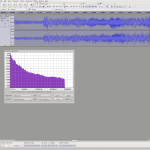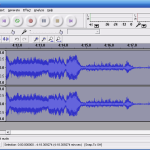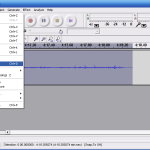Audacity
Audacity is a free open source digital audio editor and recording computer software application. Audacity was started in the fall of 1999 by Dominic Mazzoni and Roger Dannenberg at Carnegie Mellon University and was released on May 28, 2000 as version 0.8.
In addition to recording audio from multiple sources, Audacity can be used for post-processing of all types of audio, including podcasts by adding effects such as normalization, trimming, and fading in and out.
Audacity’s features include:
Importing and exporting of WAV, AIFF, MP3 (via the LAME encoder, downloaded separately), Ogg Vorbis, and all file formats supported by libsndfile library. Versions 1.3.2 and later support Free Lossless Audio Codec (FLAC). Version 1.3.6 and later also support additional formats such as WMA, AAC, AMR and AC3 via the optional FFmpeg library.
Recording and playing back sounds, Scrubbing (Version 2.1.1 and later).
Editing via cut, copy, and paste, with unlimited levels of undo.
Conversion of cassette tapes or records into digital tracks by splitting the audio source into multiple tracks based on silences in the source material.
Multitrack mixing.
A large array of digital effects and plug-ins. Additional effects can be written with Nyquist, a Lisp dialect.
Built-in LADSPA, VST(32-bit) and Nyquist plug-in support.
Amplitude envelope editing.
Noise Reduction based on sampling the noise to be minimized.
Vocal Reduction and Isolation for the creation of karaoke tracks and isolated vocal tracks.
Audio spectrum analysis using the Fourier transform algorithm.
Support for multi-channel modes with sampling rates up to 96 kHz with 32 bits per sample.
Precise adjustments to the audio speed (tempo) while maintaining pitch in order to synchronize it with video or run for a predetermined length of time.
Adjusting audio pitch while maintaining speed and adjusting audio speed while maintaining pitch.
Features of modern multitrack audio software including navigation controls, zoom and single track edit, project pane and XY project navigation, non-destructive and destructive effect processing, audio file manipulation (cut, copy, paste).
Audacity uses the wxWidgets software library to provide a similar graphical user interface on several different operating systems.
LADSPA, VST (32-bit) and Audio Unit (OS X) effects now support real-time preview (from version 2.1.0 onwards). Note: Real-time preview does not yet support latency compensation.
Saving and loading of user presets for effect settings across sessions (from 2.1.0 onwards).
Alternative To: Adobe Audition, Sony Sound Forge
OS Supported: Windows, Mac, Linux
License Type: GNU General Public License
Site Link: http://www.audacityteam.org/
Download Page: http://www.audacityteam.org/download/
https://theopen.club/open-softwares/multimedia/audio/audacity/https://theopen.club/wp-content/uploads/2016/02/audacity-logo.pnghttps://theopen.club/wp-content/uploads/2016/02/audacity-logo-150x150.pngAudioAdobe Audition,Audacity,Audio Editing Softwares,Free Audio Editing Softwares,Open Source Audio Editing Softwares,Sony Sound ForgeAudacity is a free open source digital audio editor and recording computer software application. Audacity was started in the fall of 1999 by Dominic Mazzoni and Roger Dannenberg at Carnegie Mellon University and was released on May 28, 2000 as version 0.8. In addition to recording audio from multiple sources,...theOPEN.clubtheOPEN.club info@theopen.clubAdministratortheOPEN.club



Leave a Reply
You must be logged in to post a comment.